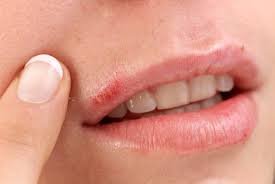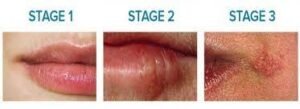Cold Sores
Cold sores, also known as fever blisters, are a common viral infection caused by the herpes simplex virus (HSV).
Cold sores are an infectious and contagious pathology characterized by the appearance of small annoying and itchy blisters on the skin and mucous membranes of the lip area: the herpetic infection can degenerate and also spread to the cheeks and palate. While there is no cure for the herpes simplex virus, various treatments and preventive measures can help manage and alleviate cold sore symptoms.
Causes
The labial infection caused by Herpes simplex type I is favored by multiple factors: prolonged intake of antibiotics, decline in immune defenses, excessive sun exposure, infectious diseases, stress and hormonal changes (e.g. menstrual cycle, pregnancy). HSV, specifically HSV-1, is highly contagious and can be transmitted through direct contact with an infected person or by sharing personal items such as utensils, towels, or lip balm. Symptoms
A clear indicator of the manifestation of labial herpes is the typical perception of heat, discomfort and tension in the lip contour: subsequently, the infection continues with the appearance – on the skin and on the mucosa of the lips – of whitish, rounded bubbles filled with liquid, which tend to dry in 5-7 days.

Home Remedies for Cold Sore Relief:
Ice Packs:
Applying an ice pack to the affected area can help reduce inflammation and provide temporary relief from pain and itching. Use a clean cloth to wrap the ice pack and avoid direct contact with the skin.
Lemon Balm:
Lemon balm, an herb from the mint family, has antiviral properties that may help reduce the duration and severity of cold sores. Applying a lemon balm ointment or cream to the affected area can be soothing.
Aloe Vera Gel:
Aloe Vera is known for its healing properties. Applying aloe Vera gel directly to the cold sore may help promote healing and reduce discomfort.
Liquorice Root:
Liquorice root contains glycyrrhizin acid, which has been shown to inhibit the spread of the herpes virus. Applying liquorice root ointment or cream may aid in cold sore healing.

Lifestyle Changes for Cold Sore Prevention:
Stress Management:
Since stress is a common trigger for cold sore outbreaks, incorporating stress-reduction techniques into your daily routine can be beneficial. Practices such as meditation, deep breathing exercises, and regular physical activity can help manage stress levels.
Healthy Diet:
A balanced diet rich in vitamins and minerals supports overall immune system function. Foods high in lysine, such as yogurt, fish, and legumes, may help inhibit the replication of the herpes virus, while avoiding arginine-rich foods like chocolate and nuts can be beneficial.
Adequate Sleep:
Ensuring sufficient and quality sleep is essential for a robust immune system. Aim for 7-9 hours of sleep each night to support your body’s ability to fight off infections.
Sun Protection:
Prolonged exposure to sunlight can trigger cold sore outbreaks. Using lip balm with SPF, wearing a wide-brimmed hat, and avoiding excessive sun exposure can help prevent flare-ups.
Medicines
Just like genital herpes, even cold sores, when they infect humans for the first time, can no longer be definitively eradicated: in fact, these viruses tend to hide in the nerve endings and then recur if ideal conditions are established. Sometimes, after the first infection, the cold sore virus can remain silent for life.
eradicated: in fact, these viruses tend to hide in the nerve endings and then recur if ideal conditions are established. Sometimes, after the first infection, the cold sore virus can remain silent for life.
Medicines useful for alleviating the symptoms of cold sores and reducing the risk of recurrence can be applied locally or taken orally.
-
Aciclovir (e.g. Aciclovir, Xerese, Zovirax): being an inhibitor of the DNA synthesis of herpes viruses, aciclovir is indicated in the treatment of Herpes simplex skin and mucosal infections (including the relapsing form). Apply the cream (5%) locally 5 times a day for 4 days: therapy must be prompt. The active ingredient aciclovir can also be found in the form of 200 mg tablets: take one tablet orally every 4 hours for 10 days (when Herpes appears for the first time), or one 400 mg tablet three times a day , for a period varying from 7 to 10 days, based on what is prescribed by the doctor. In case of orolabial herpes, we recommend taking 400 mg 5 times a day, for 5 days.
-
Docosanol (e.g. Abreva): apply locally (on the lips) a thin layer of cream, until the entire affected area is covered. Repeat the application 5 times a day for at least 4 days. Docosanol is an active ingredient useful for inhibiting the fusion between the plasma membrane and the coat of the virus, which prevents its entry into the cells: in this way the replication of the virus is hindered.
-
Famciclovir (e.g. Famvir, Famciclovir) available in tablet form: take 1500 mg (1 tablet) orally in a single dose. Famciclovir is particularly effective when taken at the onset of symptoms (burning, pain, tingling, itching).
Penciclovir (e.g. Vectavir, Zilp): available as a 1% cream, we recommend applying penciclovir to the infected area twice daily for 4 days. It is recommended to start treatment from the very first symptomatic manifestations.
-
Trifluridine (e.g. Triherpine): This drug works by inhibiting the synthesis of the DNA of the herpes virus. Topical application of this active ingredient is recommended when acyclovir is ineffective.
-
Idoxuridine (e.g. Iducher, Idustatin): it is an antiviral drug that acts as an inhibitor of DNA virus replication, therefore it is applied in the treatment of Herpes simplex infections. Apply the product directly to the lesions 4 times a day, for 4 days. In the case of infantile Herpes simplex, the application of Idoxuridine-based products is not recommended, as is the case during pregnancy.
-
Valaciclovir (e.g. Talavir, Zelitrex) take one tablet (2 g) every 12 hours: once again, it is best to start therapy from the first prodromes.
In the event of a first episode of herpes simplex labialis, it is possible to apply analgesic creams or ointments containing NSAIDs to the infected area:
Benzydamine (e.g. Benzirin): in case of intraoral Herpes simplex, benzydamine-based rinses have a good topical analgesic action: 5 rinses of 5 ml (one teaspoon) are recommended every two hours and before meals. It is possible to find the active ingredient benzydamine also in the form of a spray for the oral mucosa: in this case, it is advisable to apply 4-8 sprays of the product per day, directly on the area affected by oral herpes.

